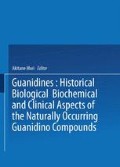Abstract
Methylguanidine (MG) is increased in the serum of uremic patients1. Giovannetti et al. considered it one of the most important uremic toxins, since the administration of MG to dogs resulted in weight loss, gastrointestinal disturbance, anemia and so on2.
Access this chapter
Tax calculation will be finalised at checkout
Purchases are for personal use only
Preview
Unable to display preview. Download preview PDF.
Reference
Y. Orita, A. Ando, Y. Tsubakihara, H. Mikami, T. Kikuchi, K. Nakata and H. Abe, Tissue and blood cell concentration of methylguanidine in rats and patients with chronic renal failure, Nephron., 27: 35 (1981).
S. Giovannetti and G. Barsotti, Methylguanidine in uremia, Arch Intern Med., 131: 709 (1973).
J. U. Koppel, Nutritional management of chronic renal failure, Postgrad. Med., 4: 135 (1978).
T. Kikuchi, Y. Orita, A. Ando, H. Mikami, M. Fujii, A. Okada and H. Abe, Liquid-chromatographic determination of guanidino compounds in plasma and erythrocyte of normal persons and uremic patients, Clin. Chem., 27: 1899 (1981).
G. Schmidt and J. Thannhauser, A method for the determination of deoxyribonucleic acid, ribonucleic acid, and phosphoproteins in animal tissues, J. Biol. Chem., 161: 83 (1945).
W. C. Schneider, Phosphorus compounds in animal tissues, J. Biol. Chem., 164: 747 (1946).
W. C. Schneider, Determination of nucleic acids in tissues by pentose analysis, in:“Method in enzymology, vol 3,” Academic Press, New York, pp. 680 (1957).
K. W. Giles and A. Myers, An improved diphenylamine method for the estimation of deoxyribonuleic acid, Nature, 4979: 93 (1965).
H. Lowry, N. J. Rosebrough, A. L. Farr and R. L. Randall, Protein measurement with Folin phenol reagent,J. Biol. Chem., 193: 265 (1951).
A. Yoshikawa and T. Masaki, Increase in protein synthetic activity in chicken muscular dystrophy, J. Biochem., 90: 1775 (1981).
J. E. Shackelford and H. G. Lebherz, Cell-free synthesis of fructose diphosphate aldolases A, B, and C, J. Biol. Chem., 254: 4220 (1979).
J. C. Waterlow, P. J. Garlick and D. J. Willward, Protein synthesis and its regulation, in:“Protein turnover in mammalian tissues and in the whole body,” North-Holland, Amsterdam, pp.24 (1978).
Author information
Authors and Affiliations
Editor information
Editors and Affiliations
Rights and permissions
Copyright information
© 1985 Springer Science+Business Media New York
About this chapter
Cite this chapter
Fujii, M. et al. (1985). Effect of Methylguanidine on Muscle Protein Synthesis. In: Mori, A., Cohen, B.D., Lowenthal, A. (eds) Guanidines. Springer, Boston, MA. https://doi.org/10.1007/978-1-4757-0752-6_20
Download citation
DOI: https://doi.org/10.1007/978-1-4757-0752-6_20
Publisher Name: Springer, Boston, MA
Print ISBN: 978-1-4757-0754-0
Online ISBN: 978-1-4757-0752-6
eBook Packages: Springer Book Archive

